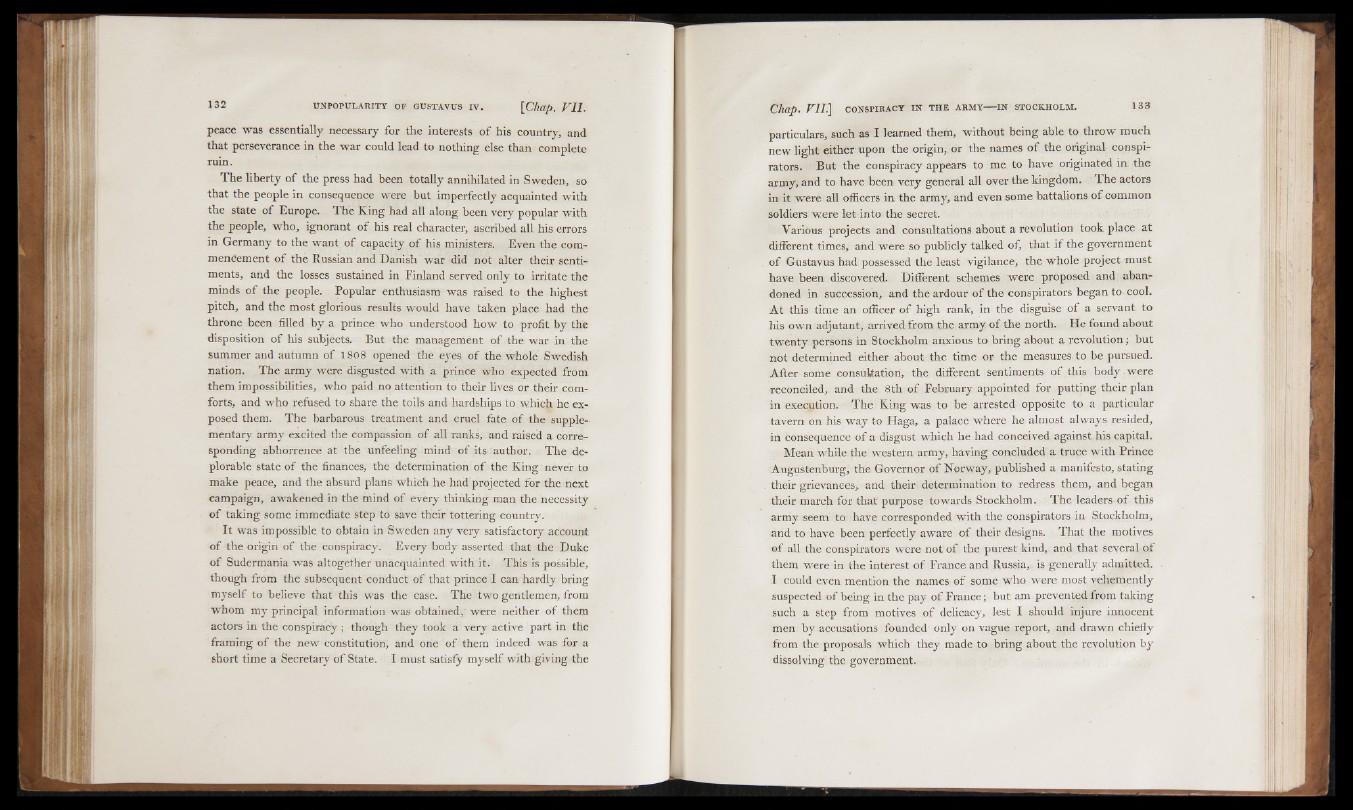
peace was essentially necessary for the interests o f his country, and
that perseverance in the war could lead to nothing else than complete
ruin.
The liberty of the press had been totally annihilated in Sweden, so
that the people in consequence were but imperfectly acquainted with
the state o f Europe. The King had all along been very popular with
the people, who, ignorant of his real character, ascribed all his errors
in Germany to the want of capacity of his ministers. Even the commencement
of the Russian and Danish war did not alter their sentiments,
arid the losses sustained in Finland served only to irritate the
minds of the people. Popular enthusiasm was raised to the highest
pitch, and the most glorious results would have taken place had the
throne been filled by a prince who understood how to profit by the
disposition of his subjects. But the management of the war in the
summer and autumn of 1808 opened the eyes o f the whole Swedish
nation. The army were disgusted with a prince who expected from
them impossibilities, who paid no attention to their lives or their comforts,
and who refused to share the toils and hardships to which he exposed
them. The barbarous treatment and cruel fate o f the supplementary
army excited the compassion of all ranks, and raised a corresponding
abhorrence at the unfeeling mind of its author. The deplorable
state of the finances, the determination of the King never to
make peace, and the absurd plans which he had projected for the next
campaign, awakened in the mind of every thinking man the necessity
of taking some immediate step to save their tottering country.
It was impossible to obtain in Sweden any very satisfactory account
o f the origin of the conspiracy. Every body asserted that the Duke
of Sudermania was altogether unacquainted with it. This is possible,
though from the subsequent conduct of that prince I can hardly bring
myself to believe that this was the case. The two gentlemen, from
whom my principal information was obtained, were neither of them
actors in the conspiracy ; though they took a very active part in the
framing of the new constitution, and one of them indeed was for a
short time a Secretary of State. I must satisfy myself with giving the
particulars, such as I learned them, without being able to throw much
new light either upon the origin, or the names o f the original conspirators.
But the conspiracy appears to me to have originated in the
army, and to have been very general all over the kingdom. The actors
in it were all officers in the army, and even some battalions of common
soldiers were let into the secret.
Various projects and consultations about a revolution took place at
different times, and were so publicly talked of, that if the government
of Gustavus had possessed the least vigilance, the whole project must
have been discovered. Different schemes were proposed and abandoned
in succession, and the ardour of the conspirators began to cool.
A t this time an officer o f high rank, in the disguise o f a servant to
his own adjutant, arrived from the army of the north. He found about
twenty persons in Stockholm anxious to bring about a revolution ; but
not determined either about the time or the measures to be pursued.
After some consultation, the different sentiments of this body .were
reconciled, and the 8th of February appointed for putting their plan
in execution. The King was to be arrested opposite to a particular
tavern on his way to Haga, a palace where he almost always resided,
iri consequence of a disgust which he had conceived against his capital.
Mean while the western army, having concluded a truce with Prince
Augustenburg, the Governor of Norway, published a manifesto, stating
their grievances^ and their determination to redress them, and began
their march for that purpose towards Stockholm. The leaders o f this
army seem to have corresponded with the conspirators in Stockholm,
and to have been perfectly aware of their designs. That the motives
of all the conspirators were not of the purest kind, and that several o f
them were in the interest of France and Russia* is generally admitted.
I could even mention the names o f some who were most vehemently
suspected of being in the pay of France; but am prevented from taking
such a step from motives of delicacy, lest I should injure innocent
men by accusations founded only on vague report, and drawn chiefly
from the proposals which they made to bring about the revolution by
dissolving the government.